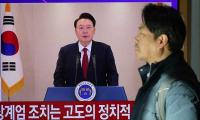ISLAMABAD: In a belated development, the World Bank (WB) that brokered the 1960 Indus Waters Treaty has almost completed the formation of Court of Arbitration by appointing two new technical and legal members, a senior official at the Ministry of Law and Justice told The News.
Pakistan had long been seeking a Court of Arbitration to resolve the disputes over the designs of India’s 330 MW Kishenganga Hydropower Project and 850 MW Ratle Hydropower Project.
“Pakistan has also finalised its two arbitrators for the forum. And if India does not provide its two arbitrators, even then the CoA would be considered a complete forum with just 5 members,” a senior official of Pakistan said. According to the statement issued on October 17, the World Bank already appointed Sean Murphy as Chairman of the Court of Arbitration (CoA) and Michel Lino as Neutral Expert. Under the treaty, the Neutral Expert Forum consists of one man, and the Court of Arbitration comprises 7 members – one chairman, two arbitrators each from parties to the dispute (Pakistan and India), a technical member and a legal member. The official explained that the Chief Justice of the USA Supreme Court appoints the legal member and Rector Imperial College London appoints a technical member as part of the Court of Arbitration. The process has now been completed.
Pakistan wanted the WB to constitute the CoA to resolve the long-standing dispute in the designs of 330 MW Kishenganga Hydropower Project built by India on the tributary of River Jhelum River and the 850 MW Ratle Hydropower Project being built on River Chenab. The rivers Indus, Jhelum, and Chenab were assigned as Pakistan’s rivers after the signing of the Indus Waters Treaty in 1960. On the other hand, India wanted the World Bank to constitute the forum of one-man Neutral Expert.
Pakistan has raised three objections to the Kishanganga project’s design, saying the pondage of the project is 7.5 million cubic meters, which is excessive and it should be one million cubic meters. Pakistan also wants India to raise intake by up to 1-4 meters and also raise spillways up to nine meters. On Ratle Hydropower Plant, Islamabad had raised four objections. Pakistan wants India to maintain the freeboard at one meter whereas India wants to keep it at two meters. In addition, India wants to keep the pondage of 24 million cubic meters but Pakistan wants it to be restricted to eight million cubic meters. Pakistan also wants the project’s intake to be raised by 8.8 meters and its spillways should be raised by up to 20 meters.
Pakistan moved the World Bank in 2016 for the constitution of the Court of Arbitration to resolve the design disputes of these projects. However, the World Bank in December 2016 announced a Pause in the constitution of the Court of Arbitration (CoA) after the Indian objection. New Delhi instead wanted the issue to be settled by a Neutral Expert forum. Eventually, after five years, the World Bank lifted the ‘stay’ and announced to reinitiate the process to constitute the Court of Arbitration (CoA) as demanded by Pakistan.
The development follows a huge effort from Pakistan. According to a senior official, a high-powered delegation headed by Pakistan’s federal minister for law and justice, the Attorney General, the head of international dispute at AG office, the Indus Waters Commissioner, Executive Director of Pakistan in the World Bank and a representative of Pakistan Embassy in the US met top notches of the World Bank’s legal department in Washington, DC, on October 4, 2022.
During the meeting, Pakistan’s commissioner of Indus Waters Syed Mehr Ali Shah strongly advocated for parallel formation of the Court of Arbitration and Neutral Expert. Pakistan asked the World Bank to seek confirmation of the names of both panels. The World Bank argued, saying seeking confirmation was not allowed in the Indus Waters Treaty. In his response, Syed Mehr Ali Shah argued that the World Bank in Dec, 2016 announced and executed ‘the pause’ in the way of the constitution of CoA, which was also not part of the Indus Waters Treaty.
This argument made the WB legal team speechless. After the World Bank sought to reconfirm the arbitrators from both countries, Pakistan finalised the names of two arbitrators. The Pakistan delegation also insisted the World Bank ensure parallel completion of the Neutral Expert and Court of Arbitration. They also asked for assurances that the two forums would not come up with contradictory decisions.
After the meeting, the World Bank on October 17 announced the appointment of the chairman of CoA and Neutral Expert. Interestingly, the Neutral Expert was named by Pakistan.
Authorities decide to increase inland freight equalisation margin for petrol, diesel, kerosene and light diesel oil
Awan warns that floods are indicative of more severe climate events to come in absence of immediate global action
ISPR reiterates security forces' resolve to wipe out menace of terrorism
Authority decides to allow positive quarterly adjustments of Rs1,187m about 1st quarter of FY 2024-25
Govt appoints Hassan Khan as Senior Associate Digital Transformation and e-Governance in PM Office
ISPR statement says Pakistan-China joint exercise was conducted from November 19 to December 11







